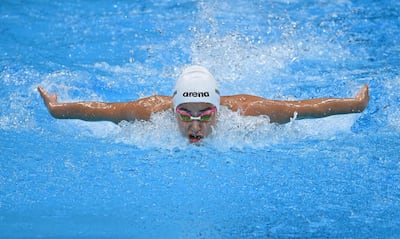Last December, Yusra Mardini, 26, stood up in front of hundreds at the Global Citizens Forum in Dubai to tell her story. It’s a remarkable one. Documented in her book Butterfly, it was also vividly brought to life in Sally El Hosaini’s film The Swimmers on Netflix.
When natural disasters, mass displacement of people or war take place around the world, it is often the personal accounts that allow us to understand the true impact of these tragedies. Mardini’s story is one of them.
Growing up in Syria, she was living with her family peacefully in Damascus, until, in 2015, war broke out in the city, and a bomb hit the pool where she was swimming. Soon after, Mardini fled the country with her older sister Sara. From Istanbul, the sisters were forced to cross the Aegean Sea aboard a motorboat that malfunctioned.
To stop the overloaded boat from sinking, Yusra, Sara and two others jumped out and swam for three hours, pushing it to safety. All 20 refugees survived.
“We were trying to keep the boat afloat; it was an incredible team effort, and we were all praying with one voice,” recalls Mardini of the harrowing journey on a video call from her flat in Southern California, where she is now studying. “Ninety-nine per cent of the people didn’t know how to swim,” a point that she is trying to address, with the launch last year on World Refugee Day of the Yusra Mardini Foundation, raising funds to, amongst other things, help refugees learn to swim.
From Greece, the siblings trekked the refugee route overland to Berlin, where they found sanctuary. Their survival was partly down to the strict competitive swimming regime applied by their father and coach, who fostered a dream in Mardini of representing Syria at the Olympics. “For me, it was always about [winning] the gold medal.”

The first thing Mardini did on arrival in Germany was swim. Her talent was spotted by a coach, who persuaded her to swim for the first Refugee Olympic Team in Rio de Janeiro in 2016. She was 18 years old and subsequently swam at the 2020 Tokyo Olympics. Her story, her resilience and her laidback, chatty style were immediately spotted by the media.
“Until Rio, I didn’t understand the power that I had and what I could do with my story,” she says. “People were fascinated by how positive my sister and I were. Just because I’m a refugee doesn’t mean that I don’t get to dream and live the life I wish for.”
The following year, in 2017, Mardini became UNHCR’s youngest Goodwill Ambassador: “I was someone who thought sports and winning gold is all that matters. And my story and what happened in my life completely changed that and showed me that humanity and being a voice for millions of people is way more important than a gold medal,” she explains. “If you asked me, would you want to win a gold medal or do what you’re doing right now, I’d always choose what I’m doing now.”
Mardini gave up swimming to follow her passion for helping others, though she did participate in one of the scenes in The Swimmers. This experience prompted her interest in film, and she is now studying for a film and television production degree. She is balancing her studies with co-founding her foundation and life in the spotlight.
The speech in Dubai, she believes, was an eye-opener for many about the refugee experience and drew several donors as a result. Before that, she had already secured a partnership with Oris, the Swiss watch brand that is involved in many conservation and environmental programmes around cleaning up the oceans, which appealed to the swimmer in Mardini. “It was about finding the right partners that have the same values as us, and I love the message behind them using recycled materials [ocean plastics] in their watches,” says Mardini.
The foundation aims to advance access to sports and education for refugee communities worldwide and support refugee athletes, reflecting Mardini’s own experience. Rather than offering emergency care, the foundation wants to help develop skills. This activism has already earnt her a listing in the Time 100 Most Influential People last year.
Mardini is also attracting interest from the fashion world, which she is leveraging to raise funds by modelling for brands that she feels share her ethos. “Even in fashion, I want refugees to understand that you can do whatever you want. I did sports, I was a refugee, and I now love fashion. It’s OK to dream and work towards what you want in life, and for me, there are different ways to advocate for what I do.”

